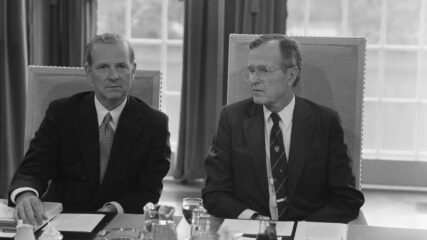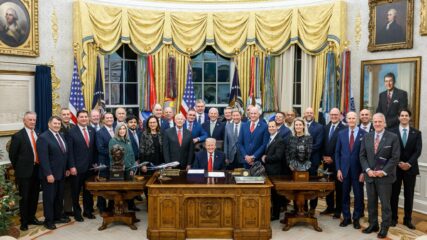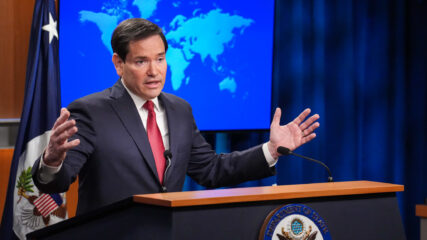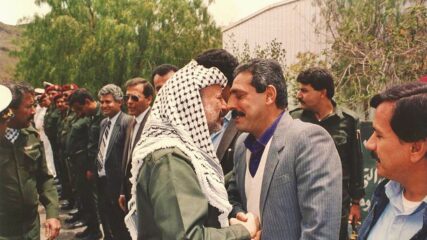September 4, 1990
House Foreign Affairs Committee, Washington, D.C.
Source: US Department of State Dispatch Bureau of Public Affairs, Sept. 10, 1990, Vol. 1, Number 2, pp 69-72
With forthright clarity, Secretary of State James Baker warned that in a post-Cold War world the United States would not let Saddam Hussein’s August 1990 invasion and erasure of Kuwait stand. In January 1991, the United States and its coalition partners ejected Iraq from Kuwait. From the Shah’s fall in Iran in 1979 through the U.S. seeking to curb Iran’s nuclear arms quest in 2022, America’s Middle Eastern engagement remained Persian Gulf-centric.
I have come here today to speak to you and — through you to the American people — about the conflict in the Persian Gulf and what is means for the United States.
I would like to use my statement today to place this crisis in a larger context. The entire world has mobilized to redress aggression against a small country in a distant place. Already, we are paying higher prices when we pull up to the local gas pump. And thousands of our finest young men and women now stand guard in the heat of the Persian Gulf.
The President has made it plain we have a straightforward responsibility to the American people. Openly and clearly, we have a duty to state what is at stake as a result of Saddam Hussein’s invasion of Kuwait. We have a duty to tell our people what our immediate goals are in this conflict. And we have a duty to explain how we plan to achieve those goals in order to further our long-run interests in the gulf and beyond.
The Stakes
Let me start by discussing what’s at stake.
First, Iraq’s unprovoked aggression is a political test of how the post-Cold War world will work. Amidst the revolutions sweeping the globe and the transformation of East-West relations, we stand at a critical juncture in history. The Iraqi invasion of Kuwait is one of the defining moments of a new era—an era full of promise but also one replete with new challenges. While the rules of the road developed during the Cold War did, in the end, preserve East-West peace in Europe, the task now is to build an enduring peace that is global in scope, not limited just to Europe and not rooted in confrontation and tension.
If we are to build a stable and more comprehensive peace, we must respond to the defining moments of this new era, recognizing the emerging dangers lurking before us. We are entering an era in which ethnic and sectarian identities could easily breed new violence and conflict. It is an era in which new hostilities and threats could erupt as misguided leaders are tempted to assert regional dominance before the ground rules of a new order can be accepted.
Accordingly, we face a simple choice: Do we want to live in a world where aggression is made less likely because it is met with a powerful response from the international community, a world where civilized rules of conduct apply? Or are we willing to live in a world where aggression can go unchecked, where aggression succeeds because we cannot muster the collective will to challenge it?
Sadly, Saddam Hussein’s attack on Kuwait will not be the last act of aggression that international society will face. So long as ruthless aggressors remain, the reality of international life is that such predatory designs will emerge from time to time. But the current crisis is a first opportunity to limit such dangers , to reinforce the standards for civilized behavior found in the UN Charter, and to help shape a more peaceful international order built on the promise of recent trends in Europe and elsewhere. We must seize this opportunity to solidify the ground rules of the new order.
Second, from a strategic standpoint, we must show that intimidation and force are not successful ways of doing business in the volatile Middle East—or anywhere else. The combination of unresolved regional conflicts, turbulent social and political changes, weapons of mass destruction, and much of the world’s energy supplies makes the Middle East particularly combustible. No one is immune from conflicts in the Middle East. And no one can feel safe when the danger of war escalating in the Middle East is so high.
If we want to encourage peaceful change and preserve the security of all our friends in the area, we must remain a reliable partner for peace. We must help demonstrate that Saddam Hussein’s violent way is an anachronism, not the wave of the future.
Third, and perhaps most obviously, what is at stake economically is the dependence of the world on access to the energy resources of the Persian Gulf. The effects on our economy and our people are already being felt. But this is not about increases in the price of a gallon of gas at your local service station. It is not just a narrow question of the flow of foil from Kuwait and Iraq. It is about a dictator who, acting alone and unchallenged, could strangle the global economic order, determining by flat whether we all enter a recession or even the darkness of a depression.
A sustained oil price spiral—similar to what happened in 1973 and again in 1979—could easily cause higher inflation and interest rates worldwide, sending us all into a sustained recessionary slide. The burden could become particularly great for the new democracies of Eastern Europe, threatening to undo the revolutions of 1989. It would also be painfully felt in the poorer countries of Central America, South Asia, and Africa—threatening those who are now embracing market-oriented reforms and striving to improve living standards for their impoverished millions.
Simply put, these are the stakes raised by Iraq’s invasion against Kuwait. How have we and the international community responded to them?
Our Objectives
For the United States, the President has identified four immediate goals:
One, the immediate, complete, and unconditional withdrawal of all Iraqi forces from Kuwait as mandated in UN Security Council Resolution 660;
Two, the restoration of Kuwait’s legitimate government;
Three, the protection of the lives of American citizens held hostage by Iraq, both in Iraq and in Kuwait; and
Four, a commitment to the security and stability of the Persian Gulf.
Our strategy is to lead a global political alliance to isolate Iraq—politically, economically, and militarily. In this way, we aim to make Iraq pay such a high price for its aggression that it will be forced t withdraw from Kuwait and release Americans and others held hostage. This in turn will allow the restoration of Kuwait’s legitimate government. It will also improve the opportunities for long-term security and stability in the Persian Gulf in a way that builds on the unprecedented international consensus that has already been formed.
Implementing the Strategy
Our strategy has moved on two mutually supporting tracks towards these aims. Let me summarize our efforts.
Diplomatically, we have worked from the beginning to foster a coordinated international response to Iraq’s aggression. The results have been extraordinary and unprecedented. Five unanimous UN Security Council resolutions have been passed. And Iraq is now isolated.
We’re gratified by the responsible and productive work we have been able to undertake with the other permanent members—Britain, France, the Soviet Union, and the People’s Republic of China — as well as the support the Arab League and the Non-Aligned Movement have provided.
In particular, the Soviet Union has proven a responsible partners, suggesting new possibilities for active super-power cooperation in resolving regional conflicts. The President will work to further strengthen our ties of partnership when he meets President Gorbachev in Helsinki this Sunday (September 9). In taking the long view, we should remember what this conflict would have booked like if old-style zero-sum thinking was still driving Soviet policy in the gulf.
NATO, the EC [European Community], and the Western European Union have pitched in magnificently. Our NATO ally, Turkey, should also be singled out for its fast, effective, and courageous cooperation. Finally, a broad regional coalition—including Egypt, Saudi Arabia, Kuwait, the gulf states and Syria—have done much to foster an international cohesion.
In this regard, let me make a larger point: From the early days of this administration, we have made a concerted effort — with our friends in Asia and Europe, with the Soviets, and with organizations like NATO and the EC — to focus on the explosive dangers inherent in regional conflicts. In response to Iraq’s invasion, we have drawn upon the new international ties being shaped by this strategy.
The Kuwaitis themselves deserve our compassion and respect. They have suffered a brutal invasion, their country pillaged, their lives traumatized. There has been a tragic loss of life, and thousands of Kuwaitis have fled to neighboring states, escaping in many cases with only the clothes on their back.
The Kuwaitis, however, are fighting back heroically. They are not collaborating with the Iraqi occupiers. All elements of Kuwaiti society — from religious conservatives to secular liberals-have voiced support for the restoration of the government. An indigenous Kuwaiti resistance has emerged. It carries on the struggle against Iraqi aggression from inside Kuwait. Moreover, the government of Kuwait in exile is providing financial aid to support our military effort and to help alleviate economic disruptions that have occurred in such states as Egypt. In short, Kuwait has been occupied, not conquered.
The political coalition, bound by the principle that Saddam Hussein must be denied the fruits of aggression, has created an economic embargo under U.N. auspices that is solidly in place. Iraq’s import-dependent economy is beginning to feel the strain, and international pressures will continue to grow over time as shortages mount. Sanction busters may be tempted by the lure of financial profits, but Security Council Resolution 665 — which permits enforcement by appropriate means — should ensure that Iraq’s opportunities to export its oil and import key materials will be severely constrained over time.
Saddam Hussein’s aggression has exacted a broad range of economic costs for countries across both the region and globe. The destruction of the Kuwaiti economy by Iraqi invaders has caused major economic dislocations for our friends in the region, notably Egypt and Turkey. Other countries with fragile economies, especially in Eastern Europe, are bearing heavy costs. The need to offset the burden of our own military efforts must also be addressed.
As the President announced last Thursday, we have initiated an action plan to meet these needs. Our friends around the world are responding. Saudi Arabia is meeting a large share of the fuel costs for this effort. And other gulf states are providing fuel and financial resources to the affected states.
The President has also asked [Treasury] Secretary Brady and myself to go to key nations in the gulf, Europe, and Asia to help mobilize and coordinate the international effort. We will attempt to ensure that the costs and responsibilities are shared equitably and that our various efforts complement one another. The aim is to address the vital needs of affected parties and to maintain the solidarity of the international coalition.
Time can be on the side of the international community. Diplomacy can be made to work.
On the military track, over 25 countries are now supplying men and material in support of the Security Council resolutions. U.S. military objectives are to deter an Iraqi attack on Saudi Arabia and to ensure the effective implementation of the U.N. sanctions. Our military forces are also there to protect American lives and to provide an effective and decisive military response should Iraq escalate its aggression to active combat with the multinational force.
Once the present danger passes, however, we must not let its lessons go unheeded. We have a responsibility to assure the American people that a decade from now, their sons and daughters will not be put in jeopardy because we failed to work toward long-run solutions to the problems of the gulf.
The historic international consensus we have built can become a solid foundation for successfully meeting our immediate objectives and building a safer future. It can foster a future gulf environment that will protect our interests and help us avoid having to make this kind of massive diplomatic and military effort again.
In the long run, we seek a stable gulf in which the nations of that region and their peoples can live in peace, free of the fear of coercion. We seek a region in which change can occur and legitimate security concerns can be preserved peacefully. And we seek a region in which energy supplies flow freely.
We will need to work together with governments in the gulf and outside it to build a more durable order. We will want to ensure that our friends in the area have the means to deter aggression and defend themselves, making it less necessary to send American men and women to help them. And we will work with the rest of the regional and international community to prevent further Iraqi expansionism as well as Iraqi efforts to acquire and produce weapons of mass destruction.
Resolution of today’s threat should also become a springboard for a sustained international effort to curb the proliferation of chemical, biological, and nuclear weapons and ballistic missiles in the region and elsewhere. It can become a springboard for revived efforts to resolve the conflicts which lie at the root of such proliferation, including the festering conflict between Israel and its Palestinian and Arab neighbors.
It is not enough to demonstrate that aggression and intimidation do not pay; we must show that a pathway to reconciliation and peace does exist and that it can be found with good will and good faith on all sides.
Implications for America’s Role in the World
Let me conclude by pacing Saddam Hussein’s invasion of Kuwait in historical perspective.
For over four decades, the central fact of international relations was the conflict between East and West. The Cold War reverberated across the globe, affecting everyone everywhere. Much of America’s foreign policy was either driven by, or derivative of, our efforts to contain Stalinist aggression.
Now, the central dispute of the post-war period—the East-West conflict over the future of Europe—has been transformed. Last year’s people-power revolutions in Central and Eastern Europe swept away the dictatorships of the past. In their place the people are finding freedom. Europe is becoming whole and free, and Germany will be united in peace and freedom.
An enlightened Soviet leadership has encouraged peaceful democratic change as the only legitimate road to progress. This administration has actively engaged the new thinkers and reformers in the Soviet Union. Together, we are finding common interests that will unite East and West. Partnership is replacing conflict.
As I have said many times before, American’s role in this sea change in world politics is straightforward: We must leave behind not only the Cold War but also the conflicts that preceded it.
And this is why — as the President has said from the outset — Iraq’s aggression cannot stand.
The line in the sands of Arabia is also a line in time. By crossing into Kuwait, Saddam Hussein took a dangerous step back in history. Maybe he thought the world would consider Kuwait expendable, that we would think of it as just a small, faraway country of which we knew and cared little. Possibly he remembered the 1930s when the League of Nations failed to respond effectively to Mussolini’s aggression against Abyssinia, what is today Ethiopia. Clearly, Saddam Hussein thought his crime would pay.
But the world has decided otherwise. He must not be allowed to hold on to what he stole.
The President has made our position clear. The world must stand united to defend the principles enshrined in the UN Charter.
In this effort, American must lead and our people must understand that. We remain the one nation that has the necessary political, military, and economic instruments at our disposal to catalyze a successful collective response by the international community.
Geographically, we stand apart from much of the world, separated by the Atlantic and the Pacific. But politically, economically, and strategically, there are no oceans, a policy of isolationism is no option at all. Only American engagement can shape the peaceful world our people so deeply desire.
We believe this coordinated and comprehensive international isolation of Iraq is the only peaceful path to meeting the objectives set by the President. Our efforts will, however, take time and that is what we ask most of the American people: Stand firm, be patient, and remain united so that together we can show aggression does not pay.









